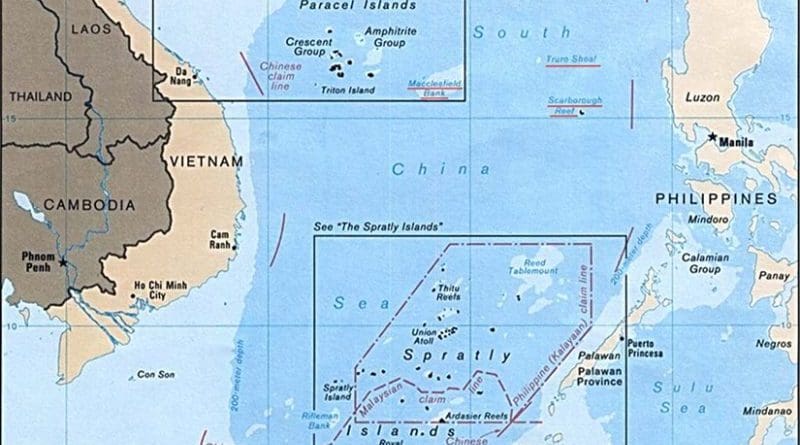Mattis’ China Visit And The South China Sea: Rising Tension And Hardening Deadlock – OpEd
In the run up to US Secretary of Defense James Mattis’ first visit to China he said “I want to go in without poisoning the well…” and do a lot of listening”. https://www.cbsnews.com/news/defense-sec-james-mattis-focuses-on-security-issues-in-china-talks/ Well he certainly got an earful regarding the South China Sea. Indeed, it is hard to imagine how he could have expected otherwise having already “poisoned the well” by repeatedly and publically calling out China regarding its policy and actions there. Deeper political currents are running and China’s leaders are certainly aware of this.
Under President Donald J. Trump, the U.S. has clearly stepped up its Freedom of Navigation Operations (FONOPs) and regular naval and air patrols in the South China Sea. Earlier this year, three US aircraft carrier battle groups conducted exercises there. But like a spike on an upward trending line, the U.S. has suddenly turned up the heat with a flurry of statements and actions. After officially identifying China as a “strategic competitor” and a “revisionist power”, the U.S. began implementing a more confrontational policy in May. First the White House announced that there would be “near- term and long- term consequences” for China’s “militarization” there. https://www.reuters.com/article/us-southchinasea-china-missiles-usa/us-says-will-be-consequences-for-chinas-south-china-sea-militarization-idUSKBN1I42FY . The Mattis-led Pentagon then rescinded its invitation to China to participate in the 2018 Rim of the Pacific Exercise because “China’s behavior [in the South China Sea] is inconsistent with the principles and purposes of the RIMPAC exercise”. https://news.usni.org/2018/05/23/china-disinvited-participating-2018-rimpac-exercise
Ironically in doing so, the U.S. ‘is cutting off its nose to spite its face’. China’s participation advantages the U.S. military by providing it an opportunity to demonstrate as a deterrent its technological superiority and to further determine China’s military weaknesses.
A two–ship FONOP followed targeting China’s maritime claims based on the Paracels, including Woody Island, a particularly sensitive military outpost for China. https://thediplomat.com/2018/05/south-china-sea-two-us-navy-destroyers-conduct-freedom-of-navigation-operation-in-paracel-islands/.
At the Shangri-La Dialogue in Singapore, Mattis warned China that the rescinding of the invitation was a “relatively small consequence and that there are much larger consequences in the future ….” He also asserted that China’s ‘militarization’ of its occupied features in the South China Sea is “for purposes of intimidation and coercion”. https://www.defense.gov/News/Transcripts/Transcript-View/Article/1538599/remarks-by-secretary-mattis-at-plenary-session-of-the-2018-shangri-la-dialogue/ Adding salt to the open wound, a draft of the US Senate’s annual defense policy bill stipulated that China could be readmitted to future RIMPAC exercises four years hence if it made positive changes in its behavior in the South China Sea. https://www.washingtonexaminer.com/policy/defense-national-security/senate-defense-bill-keep-china-out-of-rimpac-naval-exercise-until-it-pulls-weapons-from-islands
On 6 June, US nuclear capable B52 bombers overflew China-claimed Scarborough Shoal. Intended or not, the fact that this occurred on the anniversary of WWII D-Day may have sent a message. The U.S. is now reportedly considering raising the stakes by ‘intensifying’ its FONOPs in the region https://www.reuters.com/article/us-asia-security-southchinasea/u-s-weighs-more-south-china-sea-patrols-to-confront-new-reality-of-china-idUSKCN1IZ03B and sailing an aircraft carrier through the Taiwan Strait for the first time since 2007. https://www.reuters.com/article/us-usa-taiwan-military-exclusive/exclusive-at-delicate-moment-us-weighs-warship-passage-through-taiwan-strait-idUSKCN1J030R These statements and actions were issued against a background of rising US-China tension over the status of Taiwan and a probable trade war—which the US has labeled as a national security issue.
China has responded in kind to what it sees as a growing US threat. For example, its Air Force spokesperson said that the landing of nuclear capable bombers at Woody Island was training to improve its ability to ” reach all territory, conduct strikes at any time and strike in all directions as well as preparation for …. the battle for the South China Sea”. http://nationalinterest.org/blog/the-buzz/showdown-the-south-china-sea-why-china-or-america-wont-26014 . It has also undertaken its own major naval and air exercises in the South China Sea and around Taiwan. Moreover it continues to enhance its ‘defenses’ on the features it occupies.
US policy and actions so far have been ineffective in making China change its policy and tactics. Short of use of force, China is unlikely to roll back its ‘gains’, and even in the event of a US threat or use of force it may well go to war over what it considers its right to occupy and fortify (‘defend’) its sovereign territory. After repeatedly declaring that sovereignty over its territory including its features in the South China Sea is a core national security interest, for its leadership to do otherwise would be to risk its domestic legitimacy. Indeed, when Mattis brought up the US’ South China Sea concerns with China’s President Xi Jinping, Xi replied in no uncertain terms that ” Our stance is steadfast and clear-cut when it comes to China’s sovereignty and territorial integrity …. We cannot lose one inch of territory passed down by our ancestors”. For China that includes Taiwan.http://time.com/5324571/china-xi-jinping-james-mattis-south-china-sea/
Some think China assumes that the US will not go to war with it over the South China Sea issues because the question of ownership of militarily indefensible flyspecks and the resources there is not a core US national security interest.
Despite US attempts to paint Mattis’ China meetings in a positive light, it is clear that the overall relationship is deteriorating in many spheres. According to Jia Qingguo, Associate Dean of Beijing University’s School of International Relations, it is important to curb ” a downward spiral in relations”. He added that actions by both countries regarding the South China Sea and Taiwan were intensifying due to “… suspicion and speculation”. https://www.smh.com.au/world/asia/china-won-t-give-even-one-inch-of-south-china-sea-xi-tells-us-20180628-p4zo6v.html
I agree and am not optimistic that they will improve during the Trump Presidency.
*Mark J. Valencia, Adjunct Senior Scholar, National Institute for South China Sea Studies, Haikou, China
This article also appeared at IPP Review.

